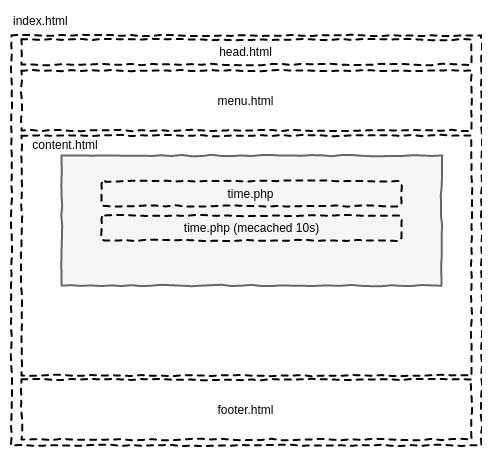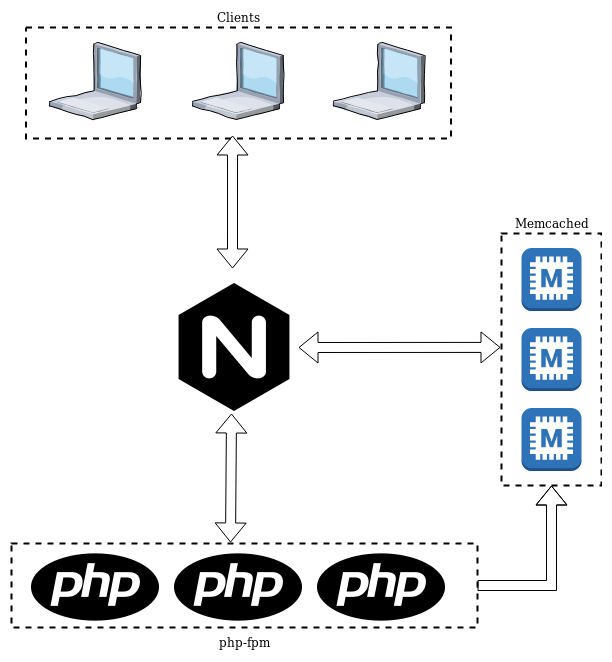This docker show how to configure Nginx with SSI (Server Side
Include). Additionally, some PHP results can be stored in Memcached and
reused by Nginx. More information how it works see section Details.
This demo is very simple and uses only raw php. It is no using any framework orcomposer dependencies.
It is not production ready solution!
Working demo can be found here
To run this demo using docker run this command:
docker run --rm --name nginx_ssi -p 9999:80 crazygoat/nginx_ssi_memcachedthen visit http://127.0.0.1:9999 in your favorite browser.
To build locally just run command below:
docker build --rm -t crazygoat/nginx_ssi_memcached .Our goal is to enable ssi in nginx and optionally cache content from
php in memcached cache. Only content of *.php files is cached.
Html files will be served directly from nginx without memcached lookup.
See diagram below how it works:
The page index.html consist of 4 SSI blocks: head.html, menu.html, content.html and footer.html
Additionally content.html include 2 blocks time.php one with cache and one without cache.
All SII blocks are placed in _ssi directory. This directory is marked as internal so
it can't be accessed via http request.
Workflow:
- Clients send request to nginx.
- Nginx parse
index.htmland make all necessary sub-request if any SSI tag is present. - Html files are included without cache lookup.
- PHP files has additional check if key exist in memcached:
- If sub-request key exits in memcached it is served from memcached.
- If sub-request key does not exist in memcached it is passed to
php-fpm. php-fpmexecutes script send response content to memcached and nginx.
- Nginx return
index.htmlcontent to the client.
SSI in nginx is disabled by default, so we need to enable it. We can do this
by adding ssi on; in nginx configuration file in server or location block.
server {
ssi on;
...
}
Now every response is checked for valid ssi command. For example:
<p class="lead">Time: <!--# include virtual="/_ssi/time.php" --></p>Nginx will make sub-request for /_ssi/time.php and the response replace comment tag
<!--# include virtual="/_ssi/time.php" -->.
If nginx make sub-request for PHP script we have to check if response already exist in memcached. If key exists we return content. If not (or some error) send request to php-fpm.
location ~ \.php$ {
# set memcached key based on request
set $memcached_key "nginx_ssi_memcached:$uri$is_args$args";
# pass request to memcached
memcached_pass 127.0.0.1:11211;
memcached_socket_keepalive on;
# grab error from memcached
proxy_intercept_errors on;
# not found or error - running normal php
error_page 404 502 = @fallback;
}
If $memcached_key does not exists in cache, memcached will return 404 status code.
If there is some connection problem between nginx and memcached 502 is returned.
Errors 404 and 502 are handled by @fallback section - standard php-fpm call.
To ensure cache key consistence between nginx and PHP,
we pass key to php-fpm using HTTP_X_MEMCACHED_KEY fastcgi_param.
location @fallback {
# Pass memcache key as header to PHP
fastcgi_param HTTP_X_MEMCACHED_KEY $memcached_key;
...
}
In PHP script it can be accessed through variable $_SERVER['HTTP_X_MEMCACHED_KEY'].
By default, script time.php prints current time.
If there is HTTP_X_MEMCACHED_KEY set and time
param is present in query string then response is stored in memcached for time seconds.
<?php declare(strict_types=1);
function cache_nginx(string $data, int $ttl = 3600): string
{
$key = $_SERVER['HTTP_X_MEMCACHED_KEY'] ?? null;
if ($ttl <= 0 || !is_string($key)) {
return $data;
}
$mem = new Memcached();
$mem->addServer("127.0.0.1", 11211);
$mem->set($key, $data, time() + $ttl);
return $data;
}
echo cache_nginx((new DateTime())->format('Y-m-d H:i:s'), intval($_GET['time'] ?? 0));We do not want to show ssi block to the world. We want them to accessible only by nginx ssi sub-request.
To do tha we need set internal for all /_ssi/* requests:
location /_ssi/ {
internal;
}

